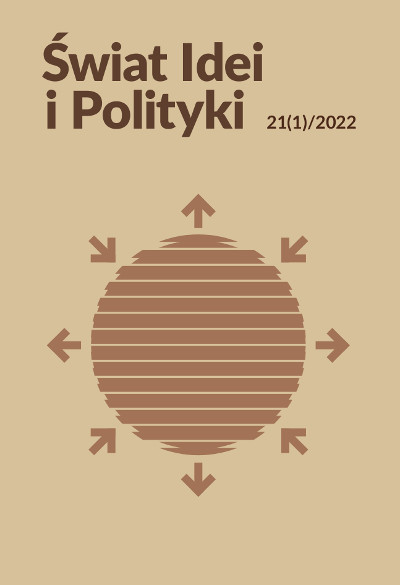(De)construction of social order. The impact of social trends during the pandemic on the security of Poland
DOI:
https://doi.org/10.34767/SIIP.2022.01.05Keywords:
pandemic, society of uncertainty, social inequality, “lost generation”, middle class, digitalisation and networking, generalized anxiety, social trends, security policyAbstract
The aim of this article is the identification and description of the key social trends which will shape the strategic environment and the security of Poland in the next few decades. The reflections are based on the secondary analyses of existing materials. The most crucial trends occurring in the contemporary society are enumerated
in the article on the basis of research reports and scientific studies. The selected ones are discussed and confirmed with statistical data. The author studies them from a local (Polish) perspective, outlining main problems, chances, challenges and threats which they bring in relation to the security of Poland. Pandemics are one of the biggest potentially negative global risks, especially in the modern, highly globalised world. Despite the fact that the global pandemic has been the subject of general discussions as a hypothetical danger for many years, its outbreak took place when nobody was prepared for it. In the face of coronacrisis, civilizational trends take more distinctive form and become more available for description and analysis. The identified trends define the foundation of security
and test the “immunity” and adaptability of modern societies and security systems. Their development brings the opportunities for innovation, but also causes that
we will have to deal with risks resulting from them and adapt to new conditions.
References
Bauman, Z. (2007). Płynne czasy. Życie w epoce niepewności. Warszawa: Wydawnictwo Sic!
Bauman, Z. (2006). Społeczeństwo w stanie oblężenia. Warszawa: Wydawnictwo Sic!
Boni, M. (2020). Młodzi 2020 – w poszukiwaniu tożsamości. Pobrano z lokalizacji:.
Drozdowski, R. & Szlendak, T. (2016). Przeciwko miniaturyzacji. Złożoność jako wyzwanie dla socjologii. W: G. Skąpska & M. Szczepański & Ż. Stasieniuk (red.), Co po kryzysie? (ss. 123–128). Warszawa: Polskie Towarzystwo Socjologiczne.
Goffman, E. (2008). Człowiek w teatrze życia codziennego. Warszawa: WydawnictwoAletheia.
Karwacki, A. & Szlendak, T. (2019). Klasa Dojna. Rozm. przepr. Paulina Błaszkiewicz. Tygodnik Powszechny, 15, 12–15.
Karwacki, A. (2020). Zagoniona klasa średnia. Rozm. przepr. Martyna Budna. Polityka, 2, 26–28.
Lepczyński, K. (2021). Ideologia klasy średniej: od modernizacyjnego projektu do niespełnionej obietnicy. Studia Socjologiczne, 4(243), 5–31. DOI: 10.24425/sts.2021.139720.
Majerek, B. (2018). Niepewność w społeczeństwie współczesnym. Studium socjopedagogiczne. Warszawa: Oficyna Wydawnicza„Impuls”.
Nowotny, H. (2005). The Increase of Complexity and its Reduction. Emergent Interfaces between the Natural Sciences, Humanities and Social Sciences. Theory, Culture Society, 22, 15–31.
Zuboff, S. (2020). Wiek kapitalizmu inwigilacji. Poznań: Wydawnictwo Zysk i S-ka.
Zybertowicz, A. (2015). Samobójstwo Oświecenia? Jak neuronauka i nowe technologie pustoszą ludzki świat. Kraków: Wydawnictwo Kasper


